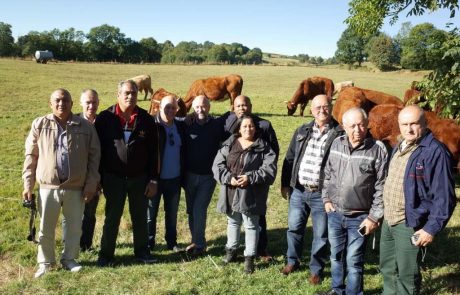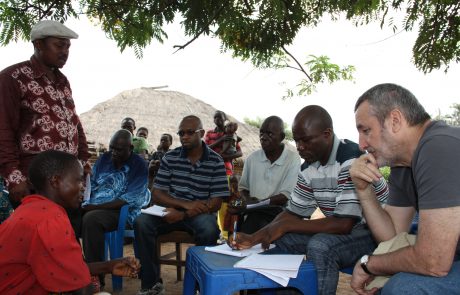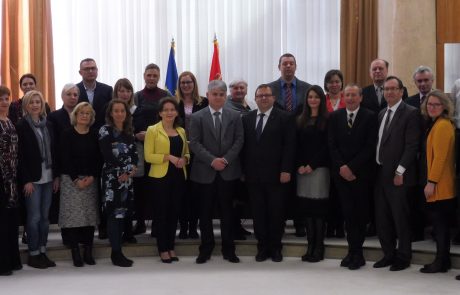La mondialisation des échanges d’animaux et de produits d’origine animale impose aux États de mettre leurs services et produits aux normes internationales et de veiller à la compétitivité de leurs productions agricoles. Compte tenu de l’importance des enjeux en termes de santé publique et d’économie, la communauté internationale se mobilise pour renforcer les performances de ses services vétérinaires, ceci, à l’initiative de l’Organisation Mondiale de la Santé Animale (OMSA), étant à présent reconnus comme un bien public mondial.
Dans ce contexte, la multiplication de crises sanitaires de grande ampleur, telle l’influenza aviaire, nécessite une maîtrise accrue des contraintes zoo-sanitaires par les États, ainsi qu’une amélioration de la gouvernance sanitaire mondiale.
En réponse à ce besoin, la France, qui a démontré la pertinence de son modèle sanitaire s’appuyant sur des compétences à la fois scientifiques et techniques, publiques et privées, a créé France Vétérinaire International (FVI), un service à présent intégré à l’ENSV, pour fédérer l’offre d’expertise française sur la scène internationale.
The globalization of trade in animals and animal products imposes on the States raising their services and products to international standards and ensuring the competitiveness of their agricultural products. Given the importance of the issues in terms of public health and economy, the international community is mobilizing to strengthen the performance of its veterinary services, at the initiative of the World Organization for Animal Health (WOAH), now recognized as a global public good. In this context, the proliferation of large-scale health crises, such as avian influenza, requires greater control of animal health constraints by the States, as well as improved global health governance.
In response to this need, France, which has demonstrated the relevance of its health model based on both scientific and technical skills, public and private, created a service named France Vétérinaire International (FVI), now integrated into ENSV, to federate the offer of French expertise on an international scale.
S’inscrivant ainsi dans les orientations générales de la politique de coopération internationale de la France, les missions de l’ENSV-FVI sont :
- Fédérer, promouvoir et coordonner la mise en œuvre de l’expertise vétérinaire à l’international dans tous les domaines de la santé publique vétérinaire : lutte contre les maladies animales et épidémiosurveillance ; sécurité sanitaire des aliments, plans de contrôle et de surveillance ; bien-être animal ; identification des animaux et traçabilité ; contrôles des médicaments vétérinaires ; alimentation animale ; gestion des sous-produits animaux ; contrôle aux frontières ; diagnostic de laboratoire ; formation et recherche vétérinaires ; appui aux administrations vétérinaires et organisation de la profession vétérinaire ; audit et évaluation en matière de bonne gouvernance vétérinaire ;
- Promouvoir la formation : formations initiales et continues à l’étranger proposées par les partenaires de l’ENSV-FVI ; élaboration d’actions de formation à l’international adaptées à la demande étrangère ; recherche de stages à l’étranger pour les étudiants des écoles vétérinaires françaises ; accueil en France d’étudiants, d’enseignants et de stagiaires étrangers ;
- Assurer une veille sur les demandes et les appels d’offres portant sur des prestations d’expertise et de formation vétérinaires, et en assurer la diffusion auprès des partenaires ; préparer les réponses aux appels d’offres internationaux dans ces domaines ;
- Développer tous outils et actions de valorisation des connaissances et contribuer à des études et recherches en lien avec ses activités, notamment aux partenariats scientifiques et techniques internationaux, en particulier dans le cadre des émergences en santé publique vétérinaire.
En savoir plus : consulter la plaquette du service FVI : Plaquette-FVI-version française
As part of the general guidelines of France’s international cooperation policy, ENSV-FVI’s missions are:
- Federate, promote and coordinate the implementation of veterinary expertise internationally in all areas of veterinary public health: fight against animal diseases and epidemiosurveillance; food safety, control and monitoring plans; animal protection and welfare; animal identification and traceability; veterinary drug controls; animal feed ; management of animal by-products; border control; laboratory diagnosis; veterinary training and research; support for veterinary administrations and organization of the veterinary services; audit and evaluation of good veterinary governance;
- Promote training: initial and continuing training abroad offered by ENSV-FVI’s partners; development of international training actions adapted to foreign demand; looking for internships abroad for students of French veterinary schools; reception in France of foreign students, teachers and trainees;
- Ensure a watch on requests and calls for tenders for veterinary expertise and training services, and disseminate them to partners; to prepare responses to international tenders in these areas;
- Develop all tools and actions to promote knowledge and contribute to studies and research related to its activities, including international scientific and technical partnerships, particularly in the context of emergencies in veterinary public health.
Know more: consult the FVI service booklet: Booklet-FVI-2020-English version



